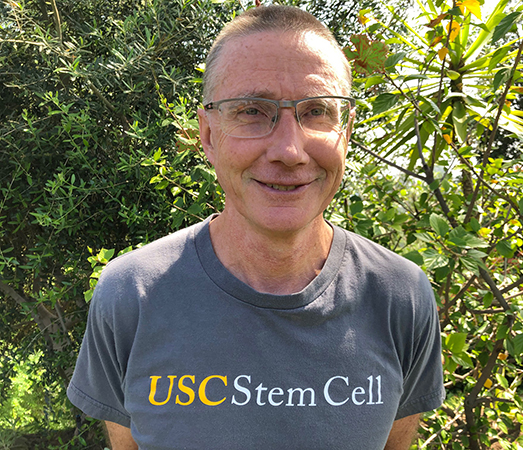
Andrew P. McMahon—who is the W.M. Keck Provost and University Professor in USC’s departments of Stem Cell Biology and Regenerative Medicine at the Keck School of Medicine, and Biological Sciences at the Dornsife College of Letters, Arts and Sciences—has been elected as a new member of the National Academy of Sciences in honor of his outstanding contributions to developmental biology. The National Academy of Sciences brings together nearly 3,000 leading researchers to provide objective, science-based advice on critical issues affecting the nation—in accordance with an Act of Congress approved by President Abraham Lincoln in 1863.
“We’re delighted that Dr. McMahon is being recognized as a newly elected member of the National Academy of Sciences,” said Dean Laura Mosqueda from the Keck School. “Because new members are elected by current members, this represents recognition of Dr. McMahon’s achievements by his most esteemed peers in all scientific fields.”
“Being elected to the National Academy of Sciences is one of the highest honors that can be bestowed upon a scientist. Dr. McMahon has had a truly remarkable career in the field of developmental biology. This honor is well deserved. We are proud of Dr. McMahon’s accomplishments and of his contributions to research and education at USC,” said USC Provost Charles F. Zukoski.
McMahon’s group is well-known for identifying key signals coordinating cell interactions directing the assembly, composition and functional organization of mammalian organ systems. This research led to the founding of a biotechnology startup and the first drug treatment for an invasive form of skin cancer.
Currently, the McMahon Lab has narrowed its focus from multiple organ systems to a single, exquisitely complex organ: the kidney. With one in 10 people worldwide affected by chronic kidney disease, McMahon has a pragmatic desire to advance stem cell research in response to this medical need.
His lab has uncovered detailed genetic and molecular clues about how developing kidneys form, as well as how adult kidneys respond to injury and disease. These discoveries inform efforts to build synthetic mini kidneys, called organoids, that can be used to study disease, identify potential drug therapies, and eventually provide functional tissue for transplantation.
McMahon laid the groundwork for his career in developmental biology when he was still a high school student in the United Kingdom, studying for his university entrance exams.
“The great thing about sitting the exam for Oxford University was that it excused me from taking the regular classes at school and allowed me to just read things that I thought were interesting,” he said. “So I started reading books about how our genes worked.”
During his undergraduate studies at Oxford University, McMahon became fascinated by how genes orchestrated the intricate process of human embryonic development.
“I’m always looking for answers to what I consider to be the most interesting question of all,” said McMahon. “How do our genes direct one cell, the egg, to generate the remarkable diversity of different cell types in our bodies?”
He continued this line of inquiry during his PhD studies at University College London, and his postdoctoral training at the California Institute of Technology. He started his independent research career at the National Institute for Medical Research in London, then moved to the Roche Institute for Molecular Biology, before joining the faculty at Harvard University in 1993.
After a nearly 20-year career at Harvard, McMahon joined USC as the Director of the Eli and Edythe Broad Center for Regenerative Medicine and Stem Cell Research in 2012. He established a new Department of Stem Cell Biology and Regenerative Medicine, which he chairs, and recruited a large cohort of early-career scientists at the start of their faculty careers.
In addition to his most recent accolade from the National Academy of Sciences, McMahon is an elected fellow of the American Association for the Advancement of Science, the American Academy of Arts and Sciences, the European Molecular Biology Organization, and the Royal Society.
His group has published more than 300 primary research articles, and 22 US patents and 30 foreign patents have been issued around his research.
“It may be a cliché, but it’s true: this recognition is really a recognition of the many talented students, postdoctoral fellows and research staff I have been privileged to work with at several institutions throughout my career,” said McMahon. “I am glad my good fortune continues at USC.”
